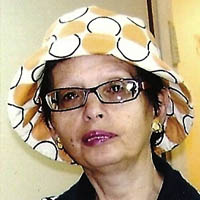
JULY 2013
Born in Birmingham, England, U.K., Natalie Wood began working in journalism a month before the outbreak of the 1973 Yom Kippur War.
She remained in regional Jewish journalism for more than 20 years, leaving full-time writing to help run a family business and then completed a range of general office work.
Natalie Wood and her husband, Brian Fink emigrated from Manchester to Israel in March 2010 and live in Karmiel, Galilee where she continues to work from home, concentrating on creative writing.
Natalie Wood features in Smith Magazine’s new Six Word Memoirs On Jewish Life. She also contributes to Technorati, Blogcritics and Live Encounters magazine.
Read Natalie Wood’s stories at http://wwwperfectlywritefamilytales.blogspot.com and her general journalism at http://wwwalwayswriteagain.blogspot.com.
When Queen Elizabeth II concluded her Diamond Jubilee celebrations with a coronation anniversary service, it was instructive to note the similarities that parts of the original sacrament had shared with the anointing of the priests and kings of ancient Israel. It appears that the process evolved to give those being anointed an extra gloss of ‘holiness’, so allowing them an aura of divine authority over ordinary people.
It is said that the biblical King Saul, who was chosen by the judge Samuel at God’s behest, found his anointing inspiring and elating; a truly life-changing moment. So it’s no surprise that monarchs in latter years believed they, too, reigned by heavenly decree.
Scholars say that the ‘holy anointing oil’ Samuel used on Saul and then King David had originally been made for the ordination of the tabernacle priests and for use on some of its appurtenances. It was created from a blend of myrrh, cinnamon, calamus (sometimes translated as ‘cannabis’), cassia and olive oil.
The traditions surrounding the anointing of a Christian monarch have continued essentially unaltered since bible times, even where they have changed in content. For example, just as Samuel initially consecrated King Saul in private, the Queen’s anointing in 1953 was concealed from immediate view although everything else that occurred that day at Westminster Abbey, London was broadcast worldwide.
Beneath a velvet and ermine outer robe, she wore a plain white dress as a symbol of humility over her sumptuous coronation gown. When the outer robe was removed, the sign of the cross was made on her head, breast and hands using an oil blend of jasmine, musk civet, orange blossom, distilled cinnamon and ambergris which had first been concocted for the coronation of King Charles I. So as we are made privy to how Queen Elizabeth accepted her role and the revelation she may believe she was briefly granted, we begin to understand the urges lying at the heart of kingship. They are not merely to satisfy a lust for power, but a sense of destiny.
The Queen, a devout Christian, became monarch of the United Kingdom and Supreme Governor of the Church of England because her father was forced to become King George VI after the abdication of his brother, King Edward VIII.
King Saul, however, was chosen because he was regarded as being both physically and morally head and shoulders above his contemporaries. The Israelites had pestered for a king who would resemble the men leading their hostile neighbours. They wanted someone to help them to wage wars and then win them.
But first, there was a furious argument with Samuel. He was not only a judge and prophet, he was the people’s intermediary with God – the supreme and eternal king. So when he warned them against having an earthly king, he was not merely guarding his judicial position, but that of the Almighty who demanded the Israelites’ exclusive loyalty.
Jewish tradition suggests that despite his many fine qualities, Saul was killed after barely two years in power because he had disobeyed God and tried to blame his subjects for what went wrong.
To extend my analogy to the modern world, Queen Elizabeth, in contrast, has reigned for more than 61 years and is possibly more popular now than ever. This is not only because she’s a quiet, steadfast individual caught up in a turbulent technical and cultural revolution. It is also because she represents a tradition of cohesive self-sacrifice and public service in a broken world. She learned from the mistake made by her Uncle David (King Edward VIII) and realised that to have abdicated her throne during the crisis following the death of Diana, Princess of Wales, she would effectively have abandoned her responsibilities. It was not only her moral integrity that prevented her doing so. There was also the ‘continuity factor’ to consider. But that should be the subject of another piece!
© Natalie Wood

